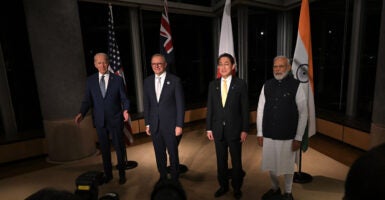Over the weekend, the leaders of Australia, India, Japan, and the U.S. will gather in Wilmington, Delaware, for the fourth in-person Quad Leaders’ Summit. As China continues to enflame tensions in the South China Sea and along the China-India border, here are four items that the Quad should prioritize during their meeting.
Maritime Security
China’s actions in the South China Sea pose one of the most dangerous threats to Indo-Pacific stability. In August alone, Chinese vessels rammed into four different Philippine ships near Sabina Shoal, which is within the Philippines’ exclusive economic zone. Chinese aircraft also conducted dangerous maneuvers near a Philippines Air Force plane.
Should China miscalculate or push too far, there is a risk of conflict that could precipitate U.S. (and potentially Japanese) involvement, given the Philippines is a U.S. treaty ally. The Quad has a strong shared interest in deterring China from escalating tensions and unilaterally changing the status quo.
Maritime domain awareness has been a growing area of cooperation for the Quad and should be enhanced further in the years ahead. Additional efforts are needed to strengthen counter illegal, unreported, and unregulated fishing by Chinese vessels throughout the Indo-Pacific.
Sovereignty
In addition to China’s actions in the South China Sea, it continues to squabble with Quad partners over territorial disputes, infringing on their sovereignty and territorial integrity. In recent years, China has picked fights—sometimes literally—with Japan over the disputed Senkaku Islands and with India along their disputed land border, the Line of Actual Control.
Most recently, China’s raised challenges to Japanese sovereignty over Okinawa, when Dalin Maritime University announced plans to establish a “Ryukyu Research Center,” which refers to when Okinawa was previously known as the Ryukyu Kingdom. This has raised concerns over whether China may press historical claims or records related to the archipelago that hosts key U.S. military bases and personnel.
In a joint statement, the Quad partners have an opportunity to oppose China’s attempts to infringe on the sovereignty and rights of Indo-Pacific states. Including such language in a joint statement allows the Quad to signal unity in the face of continued Chinese aggression across multiple fronts.
Defense Cooperation
In a broader strategic context, enhanced defense cooperation will prove critical in advancing the Quad’s primary interest of maintaining a free and open Indo-Pacific. China’s buildup of both conventional and strategic forces, including a record-setting pace of nuclear weapon production, poses direct threats to the safety and prosperity of the Quad partners.
The Biden administration’s attempts to stabilize U.S.-China relations have failed to produce tangible results that have sufficiently changed China’s decision calculus.
The Quad should continue to consider areas that would allow for stronger defense cooperation. As AUKUS, the trilateral defense agreement between Australia, the United Kingdom, and the United States, has shown, it is possible to invest in the industrial bases of allied and partnered economies and boost collective deterrence. Despite the challenges of AUKUS, similar provisions, such as intelligence and emerging technology cooperation, could be considered among the Quad partners that boost both military power and economic development.
Supply Chain Resilience
China has weaponized supply chains against each of the Quad partners, with notable examples including the 14 grievances against Australia and the bottlenecking of critical minerals against Japan. As countries look to diversify from an overreliance on Chinese supply chains, the Quad can both serve as a destination for and facilitator of reshoring actions.
India’s booming population and expanded appetite for manufacturing growth provide an attractive option for companies looking to tap into a strong labor market with reduced risk. Quad partners can look to India for their own reshoring efforts. This Quad summit would benefit from additional initiatives on supply chain collaboration that support the four countries’ resilience and shared interests.
































